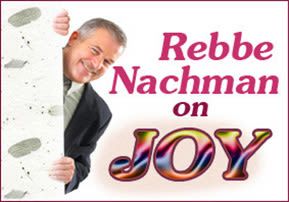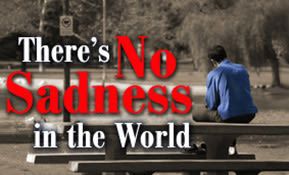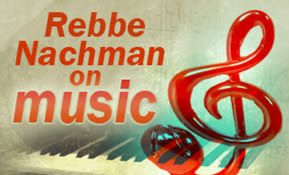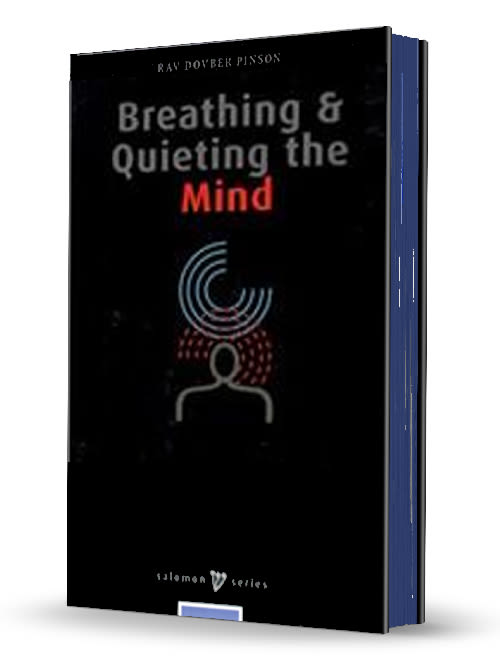
Rebbe Nachman on Joy
Rebbe Nachman of Breslev, the master physician of the soul, teaches that simchah, or joy, is required for a happy life.

Constantly Joyful
Rabbi Nachman spoke with me at length about joy. He encouraged me a great deal to be constantly joyful. He said, “When a sick person is lying in bed, people encourage him and tell him not to give up or get depressed. In that way, he can get well.” (Chayei Moharan 75, #17)
The Melody of Joy
It is a very great mitzvah to be always joyful, and to push away depression with all one’s strength.
All diseases are a result of a problem with joy.
Simchah, joy, is a state of consciousness that puts one in touch with the healthy energy in the universe.
There are ten types of melody. And melody is associated with joy.
These two ideas are reflected in the verse, “On the ten-stringed instrument…You have given me joy with Your acts, O God” (Psalms 92:4-5).
When a person’s joy, which corresponds to the ten categories of song, is incomplete, he grows ill. His corresponding ten pulses are harmed.
All diseases are included within the ten pulses.
Similarly, all melodies are included in these ten categories of song.
In accordance with a flaw in joy and melody, sickness comes.
When these ten categories of melody enter a person’s ten different pulses, they revive him (Tikkun 69, 105a).
Doctors report that sickness is due to depression, and that joy is a vital healing agent.
In future days, joy will increase tremendously. Our sages state that The Talmud states that “In the future, the Holy One, blessed be He, will be in the center of the circle of tzaddikim” (Jerusalem Talmud, Succah, Chapter Lulav V’aravah, and Midrash Rabbah, Sh’mini, 11:9).
God will make a circle of the tzaddikim, and He will be in their center.
In the Hebrew, the word “center” is written literally as “at the head.” Also, the word for circle, choleh, is homonymous with the word for a sick person. So we can understand this quote as related to the Talmudic statement that God’s presence hovers above the headboard of the sick person (Nedarim 40a).
The sick person himself has no life force. Instead, God’s presence gives him life.
In the future days, as a result of joy, illness will be rectified. Then God will be at the head of the sick person, for joy is associated with rectifying a sick person. That is why joy and dancing are both called choleh, for they both rectify illness. (Likutei Moharan II, 24)
The Task of Joy
A person must gather all his resources to be constantly happy.
As a result of day-to-day problems, human nature tends toward depression. Everyone has problems.
A person has to work very hard to force himself to be constantly joyful and to do whatever he can to make himself joyful—even with silly things.
It is true that a broken heart is very good. But that is only for a limited amount of time.
A person should set aside a certain amount of time every day to break his heart and speak to God in his own words. But for the rest of the day, he must be joyful.
It is much easier to shift from a broken heart to depression than it is to lose control as a result of joy.
So a person must be constantly joyful, except for a specific time when he has a broken heart. (Likutei Moharan II, 24)
Joy and the Tzaddik
Rabbi Nachman once encouraged someone to be joyful. He said, “Be joyful in God. Even though you don’t know God’s greatness, you should rely on me, because I know God’s greatness.” He quoted the verse, “I know how great God is” (Psalms 135:5). He added, “You should also rejoice that you had a teacher like me.” (Sichot Haran 177)
Joy through Everyday Life
Rabbi Nachman encouraged someone to be joyful even in general matters. He said to him, “At first you have to make yourself as happy as possible with everyday things. From that, you can come to true joy.” (Sichot Haran 177)
Accepting Everything with Joy
Rabbi Nachman left Breslov soon after a fire had destroyed part of the town. He said, “It was right that I leave after this [fire]. It would not be right that while others are in sorrow, I am joyful. If [my house] had not been burned, I would have to join the others in their sorrow, because when a Jew has such a sorrow, I must take part.
“But now that my house was also burned, I must accept this in love and joy, and I need to be tremendously joyful. So it isn’t right that I should be with the others; for how can I be joyful while they are full of sorrow?”
Understand this well.
Afterwards, Rabbi Nachman said, “It goes without saying that I accept losing money with joy, since ‘a person will exchange skin for skin, but he will give everything he has for his soul’ (Job 2:4). Even if God were to take my life, God forbid, I would accept that with great joy too”—to such a point that he would have to force himself to cry and act sad, for he would be filled with such great joy. Everything was as one to him, as though he weren’t in the world at all. (Chayei Moharan, p. 76, #2)
***
From “Chambers of the Palace”, an anthology of Rebbe Nachman’s writings abridged and translated by Yaacov Dovid Shulman. Writer, translator, and editor Yaacov Dovid Shulman can be contacted at: yacovdavid@gmail.com.














Tell us what you think!
Thank you for your comment!
It will be published after approval by the Editor.